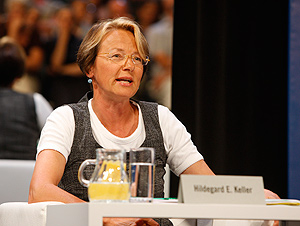 Anne Richter (Bild: Johannes Puch)
Anne Richter (Bild: Johannes Puch)
Anne Richter (D) Jury disussion
Anne Richters text "Geschwister" was invited to Klagenfurt by Hildegard E. Keller. She read as the second entrant on this last day of the competition. The jury was divided.
 Anne Richter (Bild: Johannes Puch)
Anne Richter (Bild: Johannes Puch)
Video portrait
Reading
Discussion
Sulzer: "shrill and soft at the same time"
A funeral in Thüringen is the starting point of a story about the economic death of a region - a "classic starting point" said Alain Claude Sulzer: a story about going back to one's roots, about sibling love. All in all, with a few exceptions, "well done". The sometimes clichéd characters caused him some problems: "no oncologist who reacts so terribly really exists - they would be struck off."
The text was "shrill and soft at the same time", but all in all "rather well-mannered". "It wasn't so interesting for me," since the text offered nothing new, either stylistically or in content.
 Daniela Striegl (Bild: Johannes Puch)
Daniela Striegl (Bild: Johannes Puch)
Strigl: "anaemic and sedate"
"Yes - starting from the funeral - one must do more in order to gather pace here", said Strigl, joining the discussion. The story of this "thin-blooded, easily-wounded family" was to Strigl somewhat "anaemic" and "sedate" - it lacks rigour, without which the "stuffiness" of a family history threatens to creep into the style of the text.
Feßmann: "well told"
Meike Feßmann spoke up for the text. This story about a village in Thüringen was " not nearly as obstinate as Popp's"' and rather naive but the core of the story is who will look after the elderly left behind when everyone else has left - this was " well told ". The mother is barely mentioned, except that she had been divorced from the father. The older brother takes the fathers place. This was "very nicely" told.
 Hildegard E. Keller (Bild: Johannes Puch)
Hildegard E. Keller (Bild: Johannes Puch)
Winkels: "narrative disaster"
"I do not find this text quiet, on the contrary I find it very shrill," said Hubert Winkels. The text satrives too much for effect in its "precision and vividness", the "art of restraint" is not controlled, everything is "precisely depicted". "What we see here is a narrative disaster."
Keller: "Emotions - but not heartless"
Undeterred, Hildegard E. Keller defended the piece: The author who told the story in "pastel" as well as "grey tones", can sit here "happy and glad". The death of an entire region is depicted through one individual death. This is about two pairs of siblings, with the focus being on a lifelong relationship, shown through the relationship of the father to the brother and the two sisters. The story is played out in East Germany but only "behind frosted glass", it could happen anywhere.
The author tells the story of the death as a fundamental human experience in an "objective" style, "free from emotion - but not heartless". These little dramas were "certainly not sensational" but recognisable in every human life. A central point is also how memory is processed.
 Burkhard Spinnen (Bild: Johannes Puch)
Burkhard Spinnen (Bild: Johannes Puch)
Spinnen: "For me it did not succeed"
Burkhard Spinnen, in spite of the above, tended to agree with his colleagues When death occurs in reality, it is because death was the "biological conclusion" to life. In literature death is always "for something". Here it is the dying region, which is reflected in the collapse and death of a family.
The text is created in a classic and traditional way, said Spinnen, though he would like to see the author given great credit for her "discretion". Unfortunately the text when reading "often drifted apart", the relationships became "no longer perceptible" for him. "For me it did not succeed".
Jandl remains dissatisfied
Paul Jandl continued: "It is not clear why something happens. There is meaning on the small scale but on the larger scale there is nothing. I am not satisfied with a mere description."
Barbara Johanna Frank
 TDDL 2011
TDDL 2011